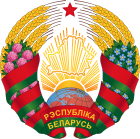
Belarus, officially the Republic of Belarus, is a landlocked country in Eastern Europe. It is bordered by Russia to the east and northeast, Ukraine to the south, Poland to the west, and Lithuania and Latvia to the northwest. Belarus spans an area of 207,600 square kilometres (80,200 sq mi) with a population of 9.1 million. The country has a hemiboreal climate and is administratively divided into six regions. Minsk is the capital and largest city; it is administered separately as a city with special status.
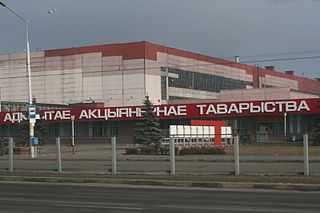
Belshina is a tyre manufacturer in Belarus. The name is an abbreviation for "Belaruskaya shina", or "Belarusian Tyre".

The Belarusian Presidential Guard or officially the Presidential Security Service is a law-enforcement body that was designed to protect the President of Belarus and other high-ranking officials and officers.

The State Security Committee of the Republic of Belarus is the national intelligence agency of Belarus. Along with its counterparts in Transnistria and South Ossetia, it kept the unreformed name after declaring independence.
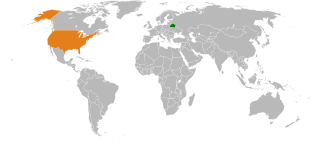
Interstate relations between the United States and Belarus began in 1991 upon the dissolution of the Soviet Union, of which Belarus had been a part. However, the relations have turned negative due to accusations by the United States that Belarus has been violating human rights. Belarus, in turn, has accused the United States of interfering in its internal affairs.

Mutual relations between the Republic of Belarus and the European Union (EU) were initially established after the European Economic Community recognised Belarusian independence in 1991.

Lidia Mikhaylovna Yermoshina is a Belarusian politician. She was a member of the Central Election Commission of Belarus (1992–1996), and Chairwoman (1996–2021).

The Internal Troops of the Ministry of Internal Affairs is an Internal Troops - paramilitary law enforcement force in the Republic of Belarus under the national Ministry of Internal Affairs. All personnel are trained in the Internal Troops Faculty of the Military Academy of Belarus.

Presidential elections were held in Belarus on 26 January 2025. The president is directly elected to serve a five-year term.
OMON or AMAP is a riot police force under the Ministry of Internal Affairs of the Republic of Belarus (MUS) that specialized in combat and patrolling in urban areas, counter-revolutionary, covert operation, crowd control and riot control when people or prisoners who are involved in a riot, unlawful demonstration or unlawful protest, high-risk law enforcement situations, HUMINT, and internal security.
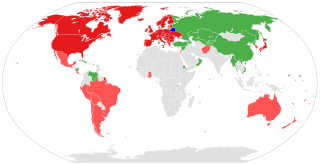
The following is a list of the official reactions to the 2020 Belarusian presidential election and the surrounding 2020 Belarusian protests.

Yury Khadzhimuratavich Karayeu is a Russian-born Belarusian General of Militsiya. He was the Minister of Internal Affairs of the Republic of Belarus from 11 June 2019 to 29 October 2020. He is also a Major General of the Police.

Okrestina Detention Centre, Akrestsina Detention Centre, officially, the Criminal Detention Centre of the Minsk Executive Committee’s Main Internal Affairs Directorate, is a pre-trial detention centre in Minsk, Belarus. The prison is known as a detention centre for activists of the Belarusian opposition arrested during mass protests against the government of president Alexander Lukashenko. On 21 June 2021, the U.S. Treasury has added Okrestina Detention Centre to its Specially Designated Nationals and Blocked Persons List.

Valery Pavlovich Vakulchik is a Belarusian civil servant and soldier. He was the Chairman of State Security Committee of the Republic of Belarus from November 16, 2012, to September 3, 2020. Vakulchik was also Secretary of the State Security Council of the Republic of Belarus from September 3, 2020, to October 29, 2020.
Mikalai Mikalayevič Karpiankou is a state security official of the government of Alexander Lukashenko in Belarus. He is a Deputy Minister of Internal Affairs of Belarus and the incumbent Commander of Internal Troops of Belarus.

Belaruskali is one of the largest state-owned companies of Belarus. It is one of the largest producers of potash fertilizers in the world, accounting for 20% global supply as of 2019.
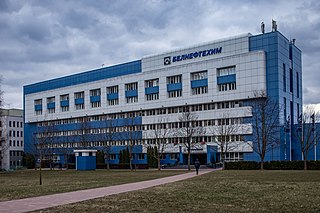
Belneftekhim is an association of petrochemical companies in Belarus, subordinated to the Council of Ministers. It manages these companies and regulates several aspects of the petrochemical sector, including setting retail prices for gasoline.

The Main Directorate for Combating Organized Crime and Corruption of the MVD of the Republic of Belarus, is a state security service of Belarus. It has been accused of numerous acts of political repression, violence and torture of political opponents of Alexander Lukashenko's regime.

Igor Vasilievich Karpenko is a Belarusian politician serving as chairman of the Central Election Commission since 2021. From 2016 to 2021, he served as minister of education. From 2012 to 2017, he served as first secretary of the Communist Party.
